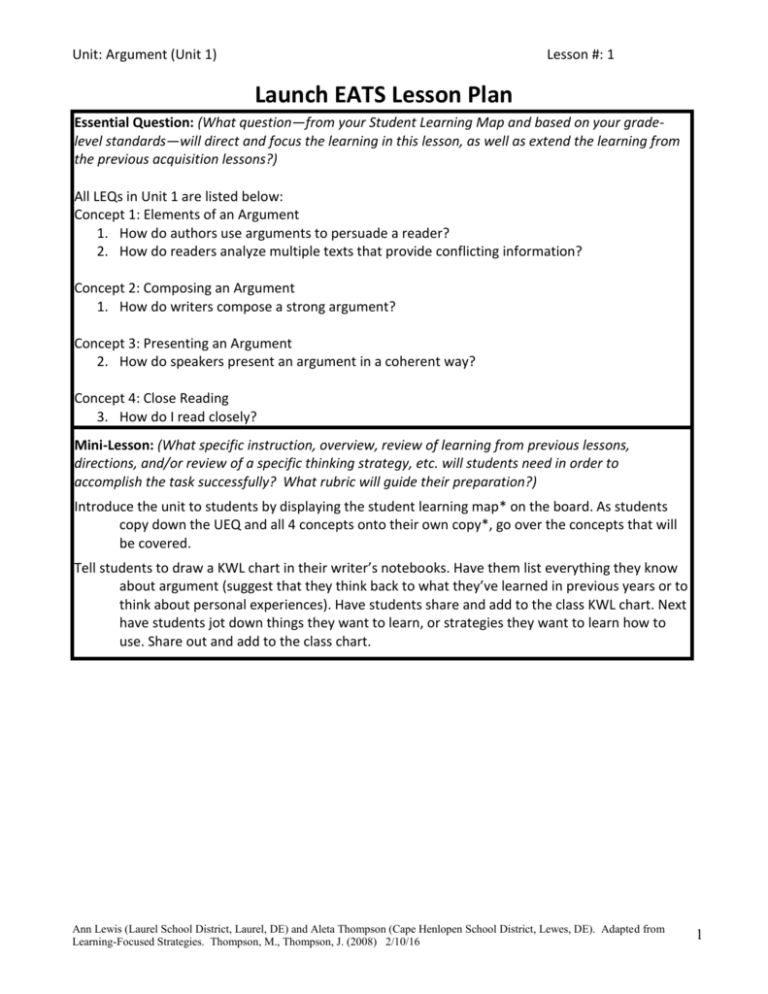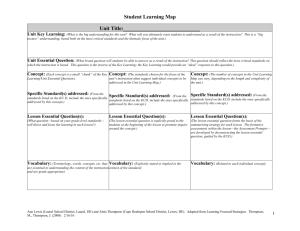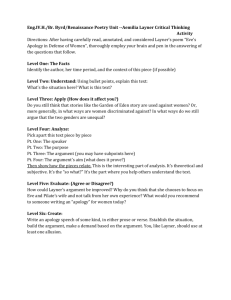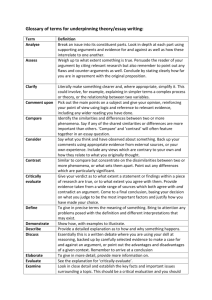Launch - TeachingNonfictionWritingWithStyle
advertisement

Unit: Argument (Unit 1) Lesson #: 1 Launch EATS Lesson Plan Essential Question: (What question—from your Student Learning Map and based on your gradelevel standards—will direct and focus the learning in this lesson, as well as extend the learning from the previous acquisition lessons?) All LEQs in Unit 1 are listed below: Concept 1: Elements of an Argument 1. How do authors use arguments to persuade a reader? 2. How do readers analyze multiple texts that provide conflicting information? Concept 2: Composing an Argument 1. How do writers compose a strong argument? Concept 3: Presenting an Argument 2. How do speakers present an argument in a coherent way? Concept 4: Close Reading 3. How do I read closely? Mini-Lesson: (What specific instruction, overview, review of learning from previous lessons, directions, and/or review of a specific thinking strategy, etc. will students need in order to accomplish the task successfully? What rubric will guide their preparation?) Introduce the unit to students by displaying the student learning map* on the board. As students copy down the UEQ and all 4 concepts onto their own copy*, go over the concepts that will be covered. Tell students to draw a KWL chart in their writer’s notebooks. Have them list everything they know about argument (suggest that they think back to what they’ve learned in previous years or to think about personal experiences). Have students share and add to the class KWL chart. Next have students jot down things they want to learn, or strategies they want to learn how to use. Share out and add to the class chart. Ann Lewis (Laurel School District, Laurel, DE) and Aleta Thompson (Cape Henlopen School District, Lewes, DE). Adapted from Learning-Focused Strategies. Thompson, M., Thompson, J. (2008) 2/10/16 1 Unit: Lesson #: Task: (What is the specific task students will need to accomplish? Will students work in groups or individually on tasks? If working in groups, how will each individual be held accountable for his/her contribution? Note: The teacher should conference with students at intervals throughout the process of responding to the task. The task may be differentiated to address student interests, readiness, learning profiles.) “Would You Rather” Ask the students if they would rather have a voice like Gilbert Gottfried or have a voice like Elmo. Briefly play the clips* below to show/remind them what their voices sound like. Have them write in their writer’s notebook first before sharing out. http://www.youtube.com/watch?v=xSorefCdmQ0 (Gilbert Gottfried) http://www.youtube.com/watch?v=6H53tr4xmBM (Elmo) During the class discussion, emphasize the importance of presenting both sides. Introduce the unit vocabulary (opposing viewpoint, counterargument, sound reasoning). Unit Pre-test: Now tell students that they will be assigned another “Would You Rather” question. Tell them to write quick reflections in their writer’s notebooks which reflect BOTH sides. (See mentor texts*) Assign one of the following to each group/section: 1. Would you rather be able to pause the world around you or to silence it? 2. Would you rather be able to fast forward life or to rewind it? 3. Would you rather live in a world without cell phones or a world without computers? 4. Would you rather spend a five-hour car ride with Bill Gates or Taylor Lautner/Kim Kardashian (In this one, the reader fills in the blanks). Share out. (collect this to use as a formative assessment) Materials/Resources Student Learning Map for Unit 1: Argument Student Learning Template Gilbert Gottfried’s voice <http://www.youtube.com/watch?v=xSorefCdmQ0> Elmo’s voice <http://www.youtube.com/watch?v=6H53tr4xmBM> KWL chart Writer’s Notebooks *materials Ann Lewis (Laurel School District, Laurel, DE) and Aleta Thompson (Cape Henlopen School District, Lewes, DE). Adapted from Learning-Focused Strategies. Thompson, M., Thompson, J. (2008) 2/10/16 2 Unit #__1____ Unit Name __Argument______________________ Unit: Argument (Unit 1) Know Irrelevant evidence Sound reasoning Grade ___8__ Lesson #: 1 Understand Authors include specific information in an argument in order to persuade the reader. Do CCSS Delineate and evaluate an argument RI 8 Determine author’s point of view or purpose, analyzing an author’s response to conflicting evidence RI 6 Analyze two or more texts with conflicting information RI 9 Delineate a speaker’s argument SL 3 Present claims and findings in a coherent manner SL 4 Use grade appropriate words/phrases L6 Write a piece expressing an argument W 1, 4, 5, 7 Adapt speech to a variety of contexts/tasks SL 6 Assess Counterargument Persuasive Techniques TBD Ann Lewis (Laurel School District, Laurel, DE) and Aleta Thompson (Cape Henlopen School District, Lewes, DE). Adapted from Learning-Focused Strategies. Thompson, M., Thompson, J. (2008) 2/10/16 Grade _8___Unit # __1___Argument __________ Unit: Lesson #: 2013-14 Key Learning: Authors include specific information in an argument in order to persuade the reader. UEQ: What specific information do authors include in an argument in order to persuade a reader? Unit Duration: 8/28/13-10/9/13 Elements of an Argument RI8, RI6, RI9 Composing an Argument W1, W4, W5, W7, L6 Presenting an Argument SL3, SL4, SL6 Close Reading RI8, RI6: How do authors use arguments to persuade a reader? W1, W4, W5, W7, L6: How do writers compose a strong argument? How do speakers present an argument in a coherent way? How do I read closely? AP topics (skill breakdown) 1. Identify traits of a coherent presentation Error Analysis Complete argument OR Constructing Support Strong/weak argument because… Use abstracting to create their own presentations evaluate other students’ presentations Error Analysis Revising for content Editing for conventions 2. Analyze a spoken argument Review Possible ETs 1. Analyze the elements of an 1. Analyze the prompt argument 2. Gather and organize 2. Analyze the author’s information and support for response to conflicting your claim evidence 3. Compose your argument 3. Evaluate the argument Culminating Activity Launch: Review basic elements of an argument LEQ1 Assignment Domain Specific Vocabulary Irrelevant evidence Sound reasoning counterargument Eye Contact Adequate Volume Clear pronunciation *These are not new words, but rather new criteria for Ann Lewis (Laurel School District, Laurel, DE) and Aleta Thompson (Cape Henlopen School District, Lewes, DE). Adapted from Learning-Focused Strategies. Thompson, M., Thompson, J. (2008) 2/10/16 Unit: Argument (Unit 1) Lesson #: 1 Name: _____________________________________ Unit 1: Argument Unit Essential Question (UEQ): LEQ Answer LEQ Answer LEQ Answer LEQ Answer Vocabulary Ann Lewis (Laurel School District, Laurel, DE) and Aleta Thompson (Cape Henlopen School District, Lewes, DE). Adapted from Learning-Focused Strategies. Thompson, M., Thompson, J. (2008) 2/10/16 Unit: Lesson #: Ann Lewis (Laurel School District, Laurel, DE) and Aleta Thompson (Cape Henlopen School District, Lewes, DE). Adapted from Learning-Focused Strategies. Thompson, M., Thompson, J. (2008) 2/10/16








